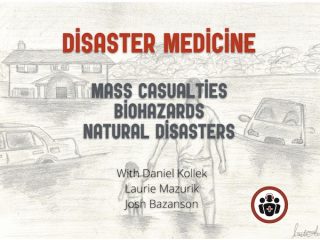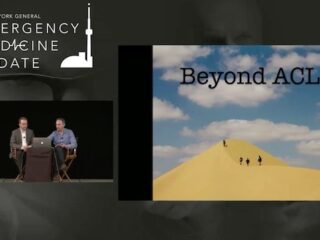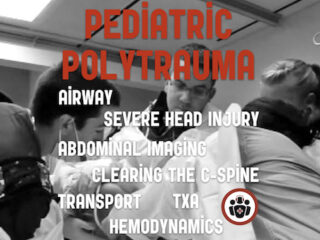
Episode 100 Disaster Medicine
As ED docs we’re particularly well suited to take a lead in disaster medicine. We own this. In this EM Cases podcast, with the help of Laurie Mazurik, Daniel Kollek and Joshua Bezanson we will help you become familiar with a general approach to mass casualties, how to handle critical infrastructure disruption in your ED, management of biohazards including airway management, chemical hazards including decontamination and finally evacuation principles in the case of a natural disaster...
Episode 99 Highlights from EMU 2017
North York General Hospital's 30th Annual Emergency Medicine Update (EMU) Conference 2017 featured some of the best talks I've ever heard from the likes of Sara Gray, Amal Mattu, David Carr and many more. I had a hard time choosing which talks to feature on this EM Cases podcast. I settled on a potpourri of clinical topics and practice tips: Leeor Sommer on Lyme disease, Chris Hicks on signover, Matt Poyner on patient complaints and Walter Himmel on acute vestibular syndrome...
Episode 98 Teaching on Shift
We discuss some quick, easy tips on how you can take your educating skills to the next level, from orienting the learner and establishing expectations at the start of the shift, to key questioning techniques to use in case presentations, to the lost art of active observation, to the One Minute Preceptor model, to giving effective end-of-shift feedback, medicine’s white whale. We end with a surprise appearance by another master educator who gives his top pearls on teaching on shift. This podcast is about how, on your next ED shift, you can make the most of every teachable moment...
Episode 96 Beyond ACLS Cardiac Arrest – Live from EMU Conference 2017
This is the first ever video podcast on EM Cases with Jordan Chenkin from EMU Conference 2017 discussing how to optimize three aspects of cardiac arrest care: persistent ventricular fibrillation, optimizing pulse checks and PEA arrest, with code team videos contrasting the ACLS approach to an optimized approach...
Episode 95 Pediatric Trauma
Management of the pediatric trauma patient is challenging regardless of where you work. In this EM Cases episode, with the help of two leading pediatric trauma experts, Dr. Sue Beno from Hospital for Sick Children in Toronto and Dr. Faud Alnaji from Children's Hospital of Eastern Ontario in Ottawa we answer such questions as: what are the most important physiologic and anatomic differences between children and adults that are key to managing the trauma patient? How much fluid should be given prior to blood products? What is the role of POCUS in abdominal trauma? Which patients require abdominal CT? How do you clear the pediatric c-spine? Are atropine and fentanyl recommended as pre-induction agents in the pediatric trauma patient? How can the BIG score help us prognosticate? Is tranexamic acid recommended in early pediatric trauma like it is in adults? Is the Pediatric Trauma Score helpful in deciding which patients should be transferred to a trauma center? and many more...
Episode 94 UTI Myths and Misconceptions
In 2014, the CDC reported that UTI antibiotic treatment was avoidable at least 39% of the time. Why? Over-diagnosis and treatment results from the fact that asymptomatic bacteriuria is very common in all age groups, urine cultures are frequently ordered without an appropriate indication, and urinalysis results are often misinterpreted. Think of the last time you prescribed antibiotics to a patient for suspected UTI – what convinced you that they had a UTI? Was it their story? Their exam? Or was it the urine dip results the nurse handed to you before you saw them? Does a patient’s indwelling catheter distort the urinalysis? How many WBCs/hpf is enough WBCs to call it a UTI? Can culture results be trusted if there are epithelial cells in the specimen? Can a “dirty” urine in an obtunded elderly patient help guide management?...







